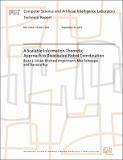| dc.contributor.advisor | Daniela Rus | |
| dc.contributor.author | Julian, Brian J. | en_US |
| dc.contributor.author | Angermann, Michael | en_US |
| dc.contributor.author | Schwager, Mac | en_US |
| dc.contributor.author | Rus, Daniela | en_US |
| dc.contributor.other | Robotics (Rus) | en |
| dc.date.accessioned | 2011-07-15T17:15:17Z | |
| dc.date.available | 2011-07-15T17:15:17Z | |
| dc.date.issued | 2011-09-25 | |
| dc.identifier.uri | http://hdl.handle.net/1721.1/64821 | |
| dc.description.abstract | This paper presents a scalable information theoretic approach to infer the state of an environment by distributively controlling robots equipped with sensors. The robots iteratively estimate the environment state using a recursive Bayesian filter, while continuously moving to improve the quality of the estimate by following the gradient of mutual information. Both the filter and the controller use a novel algorithm for approximating the robots' joint measurement probabilities, which combines consensus (for decentralization) and sampling (for scalability). The approximations are shown to approach the true joint measurement probabilities as the size of the consensus rounds grows or as the network becomes complete. The resulting gradient controller runs in constant time with respect to the number of robots, and linear time with respect to the number of sensor measurements and environment discretization cells, while traditional mutual information methods are exponential in all of these quantities. Furthermore, the controller is proven to be convergent between consensus rounds and, under certain conditions, is locally optimal. The complete distributed inference and coordination algorithm is demonstrated in experiments with five quad-rotor flying robots and simulations with 100 robots. | en_US |
| dc.description.sponsorship | This work is sponsored by the Department of the Air Force under Air Force contract number FA8721-05-C-0002. The opinions, interpretations, recommendations, and conclusions are those of the authors and are not necessarily endorsed by the United States Government. This work is also supported in part by ARO grant number W911NF-05-1-0219, ONR grant number N00014-09-1-1051, NSF grant number EFRI-0735953, ARL grant number W911NF-08-2-0004, MIT Lincoln Laboratory, the European Commission, and the Boeing Company. | en |
| dc.format.extent | 10 p. | en_US |
| dc.relation.ispartofseries | MIT-CSAIL-TR-2011-034 | |
| dc.title | A Scalable Information Theoretic Approach to Distributed Robot Coordination | en_US |
| dc.identifier.citation | In Proceedings of the IEEE International Conference on Intelligent Robots and Systems (IROS 11) | en_US |
| dc.language.rfc3066 | en-US | |
